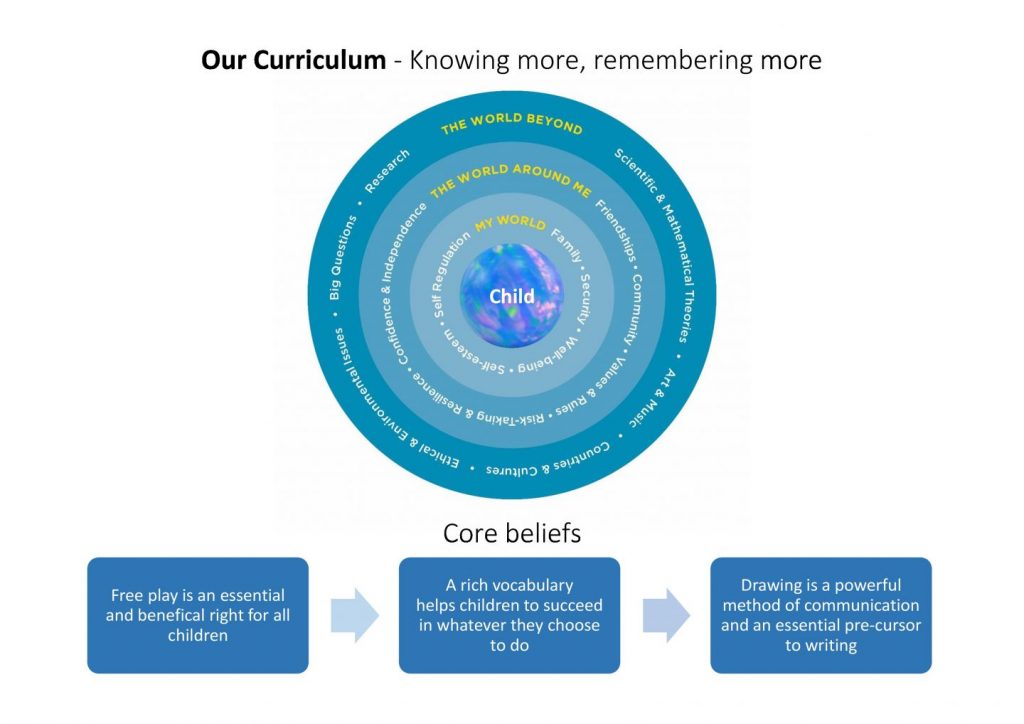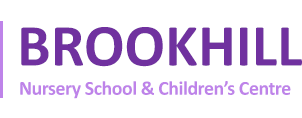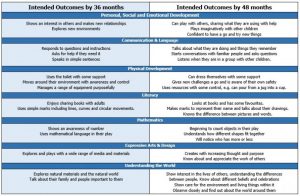Curriculum
Curriculum
See how we approach the curriculum.
Our intention
We aim for our school to be a place of possibilities. A place where children and childhood are honoured, their ideas and abilities valued. We aim to motivate, inspire and challenge children in their learning, to create a space where fascination, creativity and endless possibilities for learning are at the core of what we do.
We believe that when teaching and learning is relevant, challenging and inspiring, children will develop a true passion for learning. This passion will encompass and support every aspect of growth – physical, social, emotional, intellectual and moral.
We believe that when a child has the freedom to explore the world around them and share memorable experiences with their peers and highly trained practitioners, learning becomes joyful and long-lasting.
Our curriculum
Our Curriculum is based on 3 interconnecting worlds: my world, the world around me and the world beyond.

Our highly trained staff will use these worlds as a starting point for engaging children in learning across all seven areas of learning as outlined in the Statutory Framework for the Early Years Foundation Stage (2025).
- Communication and language development
The development of children’s spoken language underpins all seven areas of learning and development. Children’s back-and-forth interactions from an early age form the
foundations for language and cognitive development. The number and quality of the conversations they have with adults and peers throughout the day in a language-rich
environment is crucial. By commenting on what children are interested in or doing, and echoing back what they say with new vocabulary added, practitioners will build children’s language effectively. Reading frequently to children, and engaging them actively in stories, non-fiction, rhymes and poems, and then providing them with extensive opportunities to use and embed new words in a range of contexts, will give children the opportunity to thrive. Through conversation, storytelling and role play, where children share their ideas with support and modelling from their teacher, and sensitive questioning that invites them to elaborate, children become comfortable using a rich range of vocabulary and language structures. - Physical development
Physical activity is vital in children’s all-round development, enabling them to pursue happy, healthy and active lives11. Gross and fine motor experiences develop incrementally throughout early childhood, starting with sensory explorations and the development of a child’s strength, co-ordination and positional awareness through tummy time, crawling and play movement with both objects and adults. By creating games and providing opportunities for play both indoors and outdoors, adults can support children to develop their core strength, stability, balance, spatial awareness, co-ordination and agility. Gross motor skills provide the foundation for developing healthy bodies and social and emotional well-being. Fine motor control and precision helps with hand-eye co-ordination, which is later linked to early literacy. Repeated and varied opportunities to explore and play with small world activities, puzzles, arts and crafts and the practice of using small tools, with feedback and support from adults, allow children to develop proficiency, control and confidence. - Personal, social and emotional development
Children’s personal, social and emotional development (PSED) is crucial for children to lead healthy and happy lives and is fundamental to their cognitive development.
Underpinning their personal development are the important attachments that shape their social world. Strong, warm and supportive relationships with adults enable children to learn how to understand their own feelings and those of others. Children should be supported to manage emotions, develop a positive sense of self, set themselves simple goals, have confidence in their own abilities, to persist and wait for what they want and direct attention as necessary. Through adult modelling and guidance, they will learn how to look after their bodies, including healthy eating, and manage personal needs independently. Through supported interaction with other children, they learn how to make good friendships, co-operate and resolve conflicts peaceably. These attributes will provide a secure platform from which children can achieve at school and in later life. - Literacy development
It is crucial for children to develop a life-long love of reading. Reading consists of two dimensions: language comprehension and word reading. Language comprehension
(necessary for both reading and writing) starts from birth. It only develops when adults talk with children about the world around them and the books (stories and non-fiction) they read with them, and enjoy rhymes, poems and songs together. Skilled word reading, taught later, involves both the speedy working out of the pronunciation of unfamiliar printed words (decoding) and the speedy recognition of familiar printed words. Writing involves transcription (spelling and handwriting) and composition (articulating ideas and structuring them in speech, before writing). - Mathematics
Developing a strong grounding in number is essential so that all children develop the necessary building blocks to excel mathematically. Children should be able to count
confidently, develop a deep understanding of the numbers to 10, the relationships between them and the patterns within those numbers. By providing frequent and varied
opportunities to build and apply this understanding – such as using manipulatives, including small pebbles and tens frames for organising counting – children will develop a
secure base of knowledge and vocabulary from which mastery of mathematics is built. In addition, it is important that the curriculum includes rich opportunities for children to develop their spatial reasoning skills across all areas of mathematics including shape, space and measures. It is important that children develop positive attitudes and interests in mathematics, look for patterns and relationships, spot connections, ‘have a go’, talk to adults and peers about what they notice and not be afraid to make mistakes. - Understanding the world
Understanding the world involves guiding children to make sense of their physical world and their community. The frequency and range of children’s personal experiences
increases their knowledge and sense of the world around them – from visiting parks, libraries and museums to meeting important members of society such as police officers,
nurses and firefighters. In addition, listening to a broad selection of stories, non-fiction, rhymes and poems will foster their understanding of our culturally, socially, technologically and ecologically diverse world. As well as building important knowledge, this extends their familiarity with words that support understanding across domains.
Enriching and widening children’s vocabulary will support later reading comprehension. - Expressive arts and design
The development of children’s artistic and cultural awareness supports their imagination and creativity. It is important that children have regular opportunities to engage with the arts, enabling them to explore and play with a wide range of media and materials. The quality and variety of what children see, hear and participate in is crucial for developing their understanding, self-expression, vocabulary and ability to communicate through the arts. The frequency, repetition and depth of their experiences are fundamental to their progress in interpreting and appreciating what they hear, respond to and observe.
Implementation
The implementation of our curriculum is based on a clear pedagogy which recognises the following key principles:
- every child is a unique child, who is constantly learning and can be resilient, capable, confident and self-assured
- children learn to be strong and independent through positive relationships
- children learn and develop well in enabling environments with teaching and support from adults, who respond to their individual interests and needs and help them to build their learning over time. Children benefit from a strong partnership between practitioners and parents and/or carers.
- The importance of learning and development. Children develop and learn at different rates. The framework covers the education and care of all children in early years provision, including children with special educational needs and disabilities (SEND).
(DFE, Statutory Framework the Early Years Foundation stage, 2025).
Understanding and implementation of the Characteristics of Effective Learning
These characteristics explain how young children learn.
Playing and exploring – engagement
Relevant learning experiences that are engaging and interactive that facilitate challenging and sustained learning. Learning is defined as the progress in one or more of the following areas:
- Skills – being able to do something, such as a being able to pedal on a trike
- Knowledge – knowledge such as knowing where the small world resources are kept, or knowing that your heart needs to beat to all the time
- Concept : development of an understanding: such as some materials can alter their form: water to ice
- Dispositions – displaying of behaviours that enhances learning such as a willingness to persevere, to ask questions, to have a go.
Active learning – motivation
For learning to flourish children need rich opportunities that promote engagement, challenge, inspiration and fascination, for example working collaboratively to build a bridge across a stream.
Creating and thinking critically – thinking
For children’s thinking to flourish, practitioners need to know the child and establish secure relationships. It is once such secure relationships are established that practitioners can tune into children’s thinking. The use of thinking language can facilitate the means for children to reflect on their learning this includes: open ended questions, running commentaries, pondering and repeating children’s language back to them to highlight their thinking.
Extending Children’s
Thinking and Learning
We value these teaching strategies which are underpinned by a knowledge of child development and warm, trusting relationships.
Observe to Understand
- “Stand aside for a while and leave room for learning, observe carefully what children do, and then if you have understood well, teaching will be different from before” (Loris Malaguzzi)
- Use your words wisely
Open ended questions to promote thoughtfulness.
- A commentary of thoughts and actions to model language
- Ambitious, rich language to inspire children
- Specific praise so children know what they have done well
Benign Neglect
- “non-interference that is intended to benefit someone or something”
- Allow children to persevere, overcome challenges, develop independence
Model and Guide
- The Zone of Proximal Development (Vygotsky) “What a child can do in co-operation today, they can do alone tomorrow”
The environment as the third educator
- A Nursery school is a place of possibilities!
- New experiences in a rich environment to encourage new ways of thinking.
- Time, permission, open ended resources and a risk-taking culture.
Our Intended Outcomes
for all children
Learning within a place of possibilities, children will be nurtured.
Their individual interests and talents will be valued and developed.
As a result, children’s well-being will be high. They will have a belief in themselves and their abilities. They will know that they are loved, that they are strong, capable and unique. They will have resilience and the perseverance to keep on trying when things are challenging.
They will have the confidence to try new things, to take risks and be physically active. Children will know how to communicate their ideas, beliefs and feelings, choosing different ways to do this. Some children will choose to dance, others to build or draw or sing. They will have experienced and remembered a wide range of words through stories, rhymes and poems. They will have the skills to make friends and will show kindness to others. They will know how to look after themselves, their friends, their school and the environment.
They will know about important mathematical and scientific concepts. They will have an understanding and respect of the world around them and the world beyond. They will have a desire to learn and be ready for their next stage in education.
IMPACT of our
Teaching and Learning
Children’s learning will be closely monitored in close collaboration with parents to ensure that all children are supported to reach significant milestones for their age. (OP&L)
We regularly review our learning environments. Staff meet at the end of every day to talk about the learning that has taken place and what we can do to enrich further learning.
Using reflective practices and strategies, we try to see our nurseries through the eyes of the children, understanding their experiences, their learning and what we can do to support them. We watch videos of children’s play, study photos and share observations.
Senior leaders carry out regular learning walks to assess the impact of the teaching and learning environment.
Staff have regular time out of class to reflect on their key children’s learning.
We have a commitment of staff training which continues to build on staff knowledge of child development and the quality delivery of the early years curriculum.
Our Approach to Assessment
As a Federation of Nursery schools, we feel a responsibility to develop a model of effective, meaningful and principled assessment of young children’s learning.
- By effective, we mean a method of assessment that ensures that all children are supported in reaching significant milestones.
- By meaningful, we mean that the observations made inform our everyday practice and curriculum. By gaining an insight into children’s thinking, feeling and needs we can plan our environment and actions to provide future possibilities for learning.
- By principled, we mean that our focus is on observing to understand children. We will not test children or seek unnecessary knowledge. Children are recognised as individuals, not as a percentage in a pie chart.
- We will not spend unnecessary amounts of time writing observations or gathering evidence of children’s learning. We believe that if we are capturing the moment, we cannot be part of the moment. Instead we have structures in place that enable us to regularly discuss each child as a team.
Observation of Play and Learning (OP&L)
Observing children in the early years should not be a chore. We decided to stand up to the increasing demands for ‘paperwork’ and ‘evidence’ with the aim of giving ourselves time. Time to spend interacting and playing with our children, not testing them. We have written three blog posts about how we are making observation and assessment more meaningful for both children and adults.
Let’s bring back the joy of observing children in the Early Years
BEYA is working hard to build a culture of collaboration beyond our three schools and Children’s Centre. We believe we have developed a truly wonderful Observation of Play and Learning (OP&L) assessment tool that the Early Years Sector can benefit from and that we would like to share. You can read our article regarding OP&L here: https://abcdoes.substack.com/p/so-how-does-op-and-l-look-in-practice
For further information please email opal@beya.org.uk

